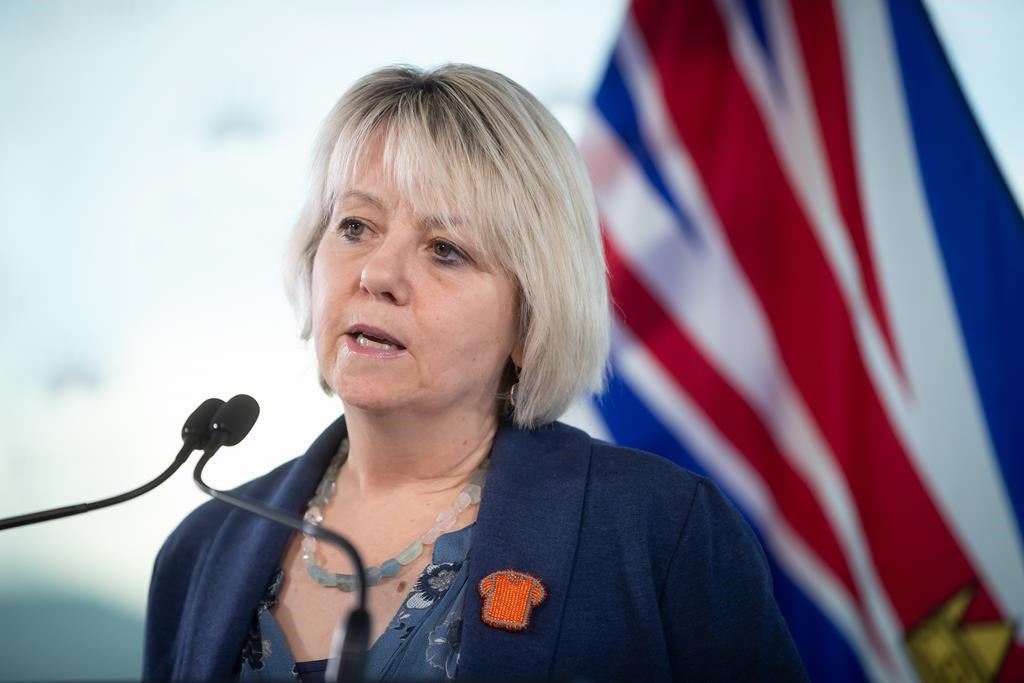Support strong Canadian climate journalism for 2025
British Columbia will drop capacity limits for indoor and outdoor gatherings including at sporting events, fitness centres, restaurants, bars and nightclubs as it shifts to a new phase of managing COVID-19 while preparing for ongoing waves of the pandemic.
Provincial health officer Dr. Bonnie Henry said a high level of vaccination among residents and decreasing hospitalization rates are allowing the province to lift most restrictions starting at 11:59 p.m. on Wednesday.
Eased restrictions mean people will be allowed to dance and mingle in public spaces but masks and the COVID-19 vaccine card will still be required at organized gatherings like weddings and sports tournaments, which will resume for adults.
Mask requirements, the vaccine card, and restrictions at long-term care homes, schools and childcare centres as well as faith services are expected to be reviewed by March 15, and again by April 12, prior to the Easter weekend, Henry said Tuesday.
"As we're in this transition phase we are not out of this pandemic in British Columbia, Canada or globally. And we know there will be continuing pressure on this virus to mutate into a new variant that may cause more serious illness, a variant that may evade some of the (immunity) benefits that we have right now."
The province is focusing on preventing illness among those at highest risk, including seniors and people who are immunocompromised, as individuals and organizations move toward a more normal way of life based on their comfort level, Henry said.
Immunization campaigns, including booster shots, will continue in B.C., where 90.5 per cent of residents over age 12 have received their second dose of a vaccine.
Henry said that while B.C. is one of the most vaccinated jurisdictions in the world, there is work to do to surpass an immunization rate of 55 per cent for a first dose for children aged five to 11, possibly through targeted clinics.
The decision to lift restrictions is based on the best science and data on what's happening in the province, she said.
"We know that for some people what we're doing today will be really fast and it will make them uncomfortable. We know as well for others it's not fast enough and they would like to see things going back toas if the virus was no longer here. But the reality is that this virus continues to circulate in the community."
While provinces including Quebec, Ontario, Alberta and Saskatchewan have dropped the requirement for vaccine cards or announced plans to do so, Henry said that policy will remain in B.C. as part of a mitigation strategy for the highest-risk settings where capacity limits have been lifted.
"We're different from Ontario and Quebec in that regard," she said. "It's played a role in reducing, and not eliminating, the risk of transmission," she said of the proof-of-vaccination card.
Premier John Horgan said pressure from protesting truckers played no part in the province lifting restrictions, which were to be eased anyway by Family Day.
"This is not brought upon the public today by any protests, any horn-honking, any encampments. It was brought about because this was the plan we had when we brought in the restrictions to protect people at a time of uncertainty," he said.
On Tuesday, British Columbia reported 787 people in hospital, 124 of them in intensive care.
Two more people have died, for a total of 2,766 deaths from COVID-19.
Morgan Churla, a wedding planner in Vancouver, said couples who have repeatedly cancelled their ceremonies, receptions or both were relieved to hear they can now plan a celebration with more guests.
"There was a lot of screaming, a lot of 'Oh, my God, oh, my God, oh, my God. Is this real?' Just overall, extreme excitement and then hitting the panic button with 'OK, we have so much to do now because we've been holding off sending invites.'"
Even vaccine passports and masks indoors won't deter those who have been waiting for their big day, some having cancelled their plans up to six times since 2020, Churla said.
"I think it's smart to keep the vaccine passport in place for now. It does give a peace of mind, especially for weddings and events when you do have older guests in attendance," she said, adding dancing is the biggest bonus for those waiting to party.
"We're going full tilt, full speed ahead with a lot of couples that were holding off because they wanted a dance party. My only fear is that it's going to be taken away from us again," she said of a possible rollback of measures if a new variant emerges.
"For now, we'll live in the excitement."
Health Minister Adrian Dix said the province is planning to offer rapid tests to students in the coming weeks.
"We also anticipate starting distribution, at no cost, to citizens of the broader community," he said of the plan to distribute tests that will begin with seniors, those at highest risk of infection and then the general public.
— By Camille Bains in Vancouver
This report by The Canadian Press was first published Feb. 15, 2022.




Comments